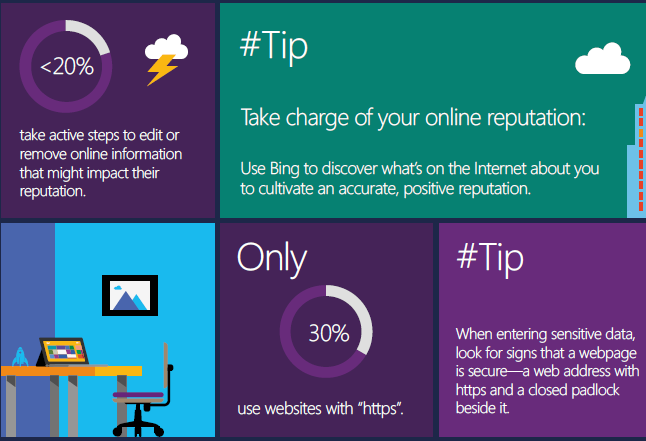For many of us, the Internet is an extension of how we live our lives every day. But sometimes the things we enjoy most online — share photos, pay bills, shop— expose us to risks that can cause harm, financially and to our online reputation. This is a significant finding from new research, the Microsoft Computing Safety Index (MCSI), which evaluates consumer online safety behaviors across 20 countries.
The research shows that the global impact of phishing attacks may be as high as $5 billion USD. Yet, the cost of repairing damage to peoples’ online reputation higher yet at nearly $6 billion, or an estimated average of $632 per loss.
Of the more than 10,000 consumers surveyed 15 percent said they were victims of a phishing attack, losing on average $158, while 13 percent said their professional reputation had been compromised, costing on average $535 to repair. The study also revealed that 9 percent said they had suffered identity theft at an average cost of $218.
Yet despite such losses, only 36 percent said they limit what strangers see on social networks and the amount of personal information online, while 33 percent said they adjust their social network privacy settings. And, only 33 percent use a PIN (personal identification number) or password to lock their mobile device.
The survey results show that education and guidance about how to avoid online risks remain key, thus Microsoft is asking consumers to “Do 1 Thing” to stay safer online and commit to doing so on a new, interactive website.
The new site allows Internet users around the world to share how they plan to avoid online risks, learn what other people are doing to help protect themselves and receive instant tips to enhance their digital lifestyle.
“There are many things you can do to stay safer online. If we all do just one thing, imagine how much safer we all will be, together,” said Jacqueline Beauchere, chief online safety officer, Microsoft. “Go to our website to share your one thing. Tell the world that you’re committed to helping keep the Internet safer and more secure. And once you do, you’ll be part of that positive change.”
The new site provides a range of hints, tips and guidance including the following:
• Help guard your devices and online accounts. Use a unique four-digit PIN for mobile devices and strong passwords for online accounts.
• Perform sensitive transactions over secured networks. This includes paying bills, banking or shopping. Don’t share personal account information over “borrowed” or public Wi-Fi connections.
• Take charge of your online reputation. Discover what information about you is on the Internet, periodically re-evaluate it, andremove unwanted or inaccurate content to cultivate an accurate, positive reputation.
• Help protect your social circles.Use privacy settings to manage the information you share and with whom you share it. Be selective about what you post and accepting friends.
“The Internet touches our lives every day; we email to stay connected, share photos and videos, pay bills, and shop,” said Jacqueline Beauchere, chief online safety officer, Microsoft. “Sometimes, though, the very experiences that we love about the Internet put us at risk.”
Google has also offered 7 ‘don’t’ tips that may help you stay safe on the interwebs:
1. Don’t use the same password for everything: It’s like handing your house keys (and every other key) to everyone you meet.
2. Don’t have an “easy” password: If your password contains the word ‘password’ or numbers in sequence, think again. One way to create (and remember) a complex password is to think of a phrase or sentence (perhaps the lyrics to a song you like?) and use the first letter of each word to create the password. Or think of places you’ve lived, and spell them backwards. Something, anything!
3. Don’t rely solely on a password: It’s so yesterday to have only a password for your most important accounts. Turn on two-factor authentication. Like your bank’s OTP, an SMS code or mobile app that gives you a second code when you’re accessing your account from an unfamiliar computer will give you extra peace of mind.
4. Don’t use an ancient browser: Keep your device’s browser and operating system up-to-date. Updating your browser means you’ll have the latest security updates. Google’s Chrome browser will automatically update for you. When you do install software, make sure you’re getting the software from a trusted source.
5. Don’t get sucked in: You almost certainly haven’t won millions dollars in a lottery. Your friends that you didn’t even know were traveling are not stuck in Nigeria asking for you to wire money over. You know the old saying, if it looks too good to be true…
6. Don’t ignore bad content: When you can, help clean the web up. Report and flag content that is abusive or illegal, which will help everyone out.
7. Don’t ignore your settings: Check your settings to find out what to expect when you share your content. Many services have powerful built-in controls that allow you to manage your privacy and security.

















































































































